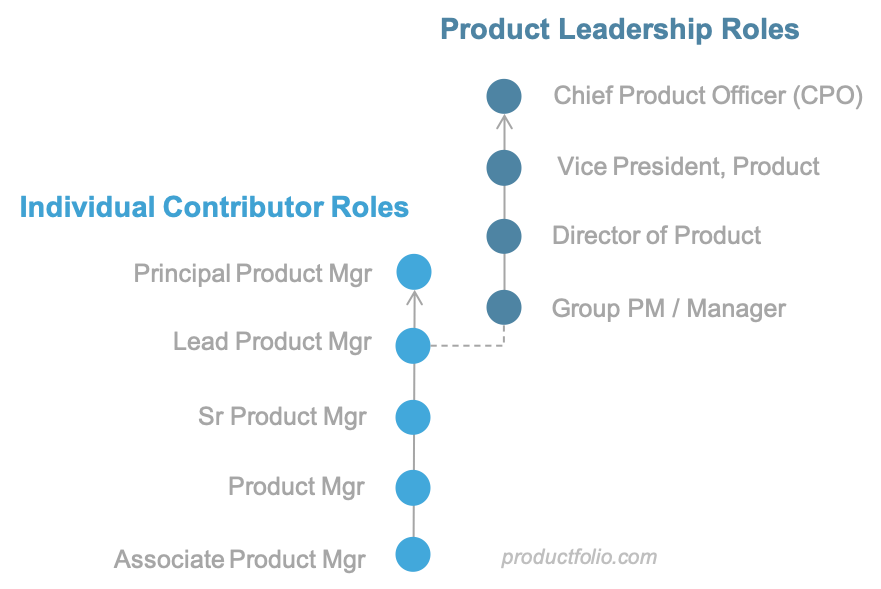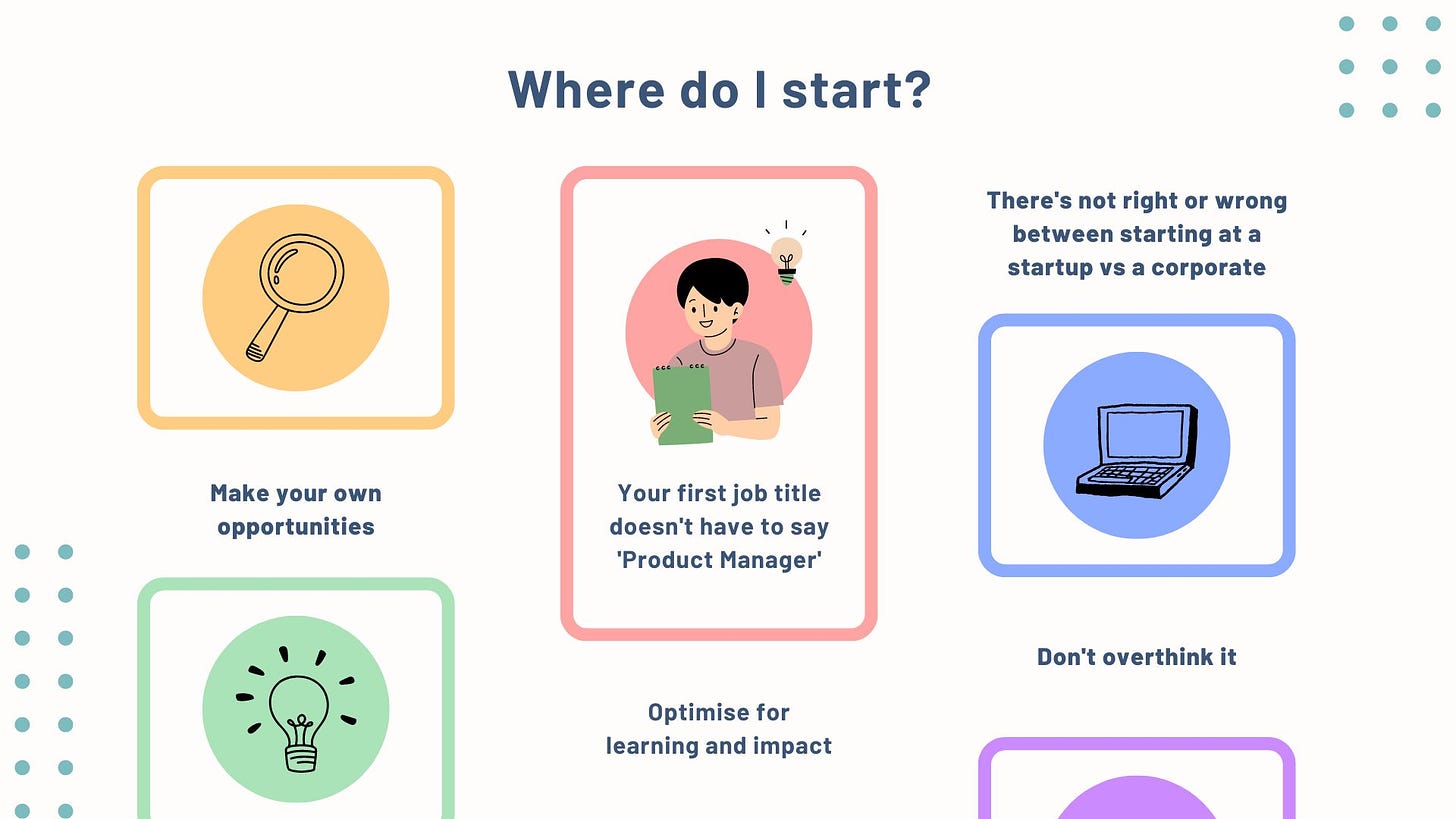Favourite learnings from 19 people in Product Management [Part 1]
Nat's learning expedition uncovering what Product Managers do and specific insights on where and how you can start to be a successful PM.
Welcome back to your Curiosity Center!
The reason for this newsletter is simple: We explore our curiosity and share what we learn along the way, and take you inside topics, companies & industries. Stay up to date by joining your friends here:
I learned about Product Management and Product Design last year, and they quickly became what I wanted to do after graduating from university. It was so exciting to discover a career path that brings together problem-solving, strategy and empathy in tech and has a close relationship with the people you are trying to solve a problem for.
But, the career path to Product Management and Product Design is not clear.
University is great at showing students what careers connect directly with the different majors they offer - for example, Finance with investment banking; Marketing with digital marketing or marketing research; and Computer Science with developer roles. What about roles that don’t exactly connect with any major? This is especially the case for Product Management, which is probably why it’s not a career many talk about at uni.
Product Managers are all across Australia & New Zealand and have been such a welcoming and supportive community of people on my learning journey. I wanted to find out more about the role and where to start - so after 19 conversations with people in this field, here is what I learned.
Welcome to part 1!
1️⃣ What PMs do
There are many great explanations of what Product Managers do, here are two of them - Chloe Shih’s YouTube channel and this article by Sherif Mansour, a Distinguished PM at Atlassian. Instead of repeating the same description of Product Management, this section will share some key learnings from the conversations:
“I think everyone works in Product, but some people just don’t realise it. For example, a lecturer’s product is education. Tech companies especially think of Product as something that is created/controlled rather than something that just exists.”
This was echoed by many PMs that arrived in Product from non-tech backgrounds. While putting themselves forward for Product roles, it was helpful to reframe a lot of their experiences and skills from a PM perspective, such as productising a service, doing discovery work, or leading a project.
There are quite a few articles about the two leading career pathways for PMs - individual contributor vs leadership:
In my conversations with people in Product Leadership, their explanation of their roles was heavily focused on looking after Product people and processes. “It’s completely different from what I did as a Product Manager.” A leadership focus means product portfolio, practice and people management, rather than managing a product itself. Responsibilities shift heavier towards coaching people, methodologies, frameworks and best practices in the company, understanding gaps in the team’s skill set, making sure the right people are on the right projects, and supporting the PMs and their development.
For an earlier-stage startup, titles mean less and a Product Director could still be involved in product strategy and even speaking with the customer. But, they all agree that it’s a lot of meetings now - with the leadership team, with the people they are leading and with other disciplines in the company (especially marketing, sales and/or customer success).
Speaking with a Principal Product Manager, the Individual Contributor path means you’re still doing discovery work and sitting down with engineering teams. But, being a senior member of a team means they will set the team’s Objectives, focus and priorities i.e. the what and why, before passing it on to the teams to set their own Key Results and the how.
“At the end of the day, it’s about being user-focused. We are always thinking about delivering value - otherwise, they won't have a good time and don’t come back.”
This is one of the first things you’ll learn about Product Management - focus on the problem and the customer you’re solving the problem for. But often it gets lost in the shinier and more complex parts of being a PM, such as stakeholder management/relationship building, communication, data analytics, methodologies, working with engineers, finding product market fit, etc. Hearing this in one of my most recent conversations was a great reminder and grounded me back to a core part of Product Management.
2️⃣ Where to start
I know I’m interested in Product Management, but where do I even start?
People barely talk about careers in Product at uni, and I’ve seen just one Product Management internship based in New Zealand (shoutout to Pushpay) this year! The competition is extremely tight overseas for the APM programs in Atlassian, Google, Meta, Uber and other big names in tech. So where could university graduates start, when we don’t have the two years’ work experience that most entry-level roles require?
Make your own opportunities. Don’t wait for job opportunities that are advertised. Relying on the traditional job application route won’t work as well, especially in NZ. Start getting your hands dirty with products in any shape or form - a COLAB course, reading and learning about PM, startup weekend, building something with your friends. This is a great way to show how you’ve understood problems before and practised things like discovery and simply making something from vision to implementation. You could also establish 1:1 connections with Product people in the companies you want to work in, eventually sharing your interest in being a part of their team.
Your first job title doesn’t have to say ‘Product Manager’. Most PMs I spoke with did not work in Product straight out of university, but eventually built their own path towards this career. Some suggested starting as a junior business analyst, product owner, product designer, engineer, sales rep, customer success rep, or marketing associate. While it may not appear obvious at first glance, starting as a sales or customer success rep would get you directly in front of your customers, which really builds your understanding of what they value and the problems they want solved. Business Analysts and Product Owners can work closely with a PM. But, a common difference between both roles and a PM is the balance between administrative tasks and strategic work, so it would be key to work with a great PM mentor that helps you build awareness of the long-term vision and product strategy.
An adjacent question I asked was if you could start your Product career all over again, where would you want to start? Some clear themes came up:
Optimise for learning and impact. Many of the PMs I spoke with stress that early on in your career, it is important you have the opportunity to learn from others and ideally a mentor. The company name is less important compared to its mission (i.e. whether it resonates with you) and the kind of support you’ll have in your learning and growth. The team you’ll work with is often under-indexed when making decisions around which job opportunities to take up. Some questions to ask in an interview to scope this out:
What is the work that I’ll be doing?
What are the goals of my role and the goals of the business?
Who specifically am I working with? What is their leadership style?
It’ll be different at an early-stage startup vs a corporate, and it’s up to you to weigh the pros and cons. Ownership, structure and funding set them apart.
At a corporate, you’re given lots of resources and structured learning. Large companies have the capacity to support your personal development if there are different projects you want to try out, and it’s easier to move in parallel. There is generally more structure in the form of processes and frameworks already set as best practices in the company.
At an earlier-stage startup, you’ll be one of the very few Product people in the team (if not the only Product person aside from the founders!) so you’ll probably be working on the same core problem (rather than jumping from project to project). But, you can be working on multiple products and directions as you look for something that sticks. You’re forced to think in a lean way because you have the freedom to take leadership and experiment, but there isn’t the same abundance of resources you’ll see in a corporate. You’d also find yourself working across multiple areas and doing tasks outside of your job description to help put out fires and reach short-term goals.
A larger company is more likely to build your product discipline, while the fast-paced nature of startups means you might be busy fighting fires and executing on things instead.
Outside of this comparison, if you’re working in an agency (where Product Managers would help multiple companies with product launches or product problems) you would meet very talented Product thinkers and move from problem to problem quickly - but you’ll rarely stick with one specific project for a long time. Ownership is usually given back to the client company when the project finishes.
Regardless, as mentioned earlier, optimise for learning. This can come in any shape and form, and there is no ‘one size fits all’ role that gives every junior the kind of learning environment they would thrive in.
It was also relieving to hear that where you start doesn’t matter that much - don’t overthink it and don’t confuse your first or current job with your destiny. Be curious, talk to people and try things out. If you’re pretty confident that the set of options in front of you are all good, don’t spend too much time optimising between them. Pick one that feels right.
That’s all for Part 1!
In Part 2, I’ll cover:
Do I need to be technical?
What does decision-making look like?
6 more pieces of valuable advice
A big thank-you to the people that said yes to a conversation about Product Management, and for generously sharing their stories.
Enjoyed reading Part 1? Subscribe and share it to help us grow together!
You can contact us directly by email at vidit@curiositycenter.xyz to share your feedback, ask questions or discuss collaborating on an article or podcast episode.
💡 Find out more about Curiosity Center.
🎙 Enjoy 98+ episodes w relatable role models from 40+ industries on The High Flyers Podcast.





